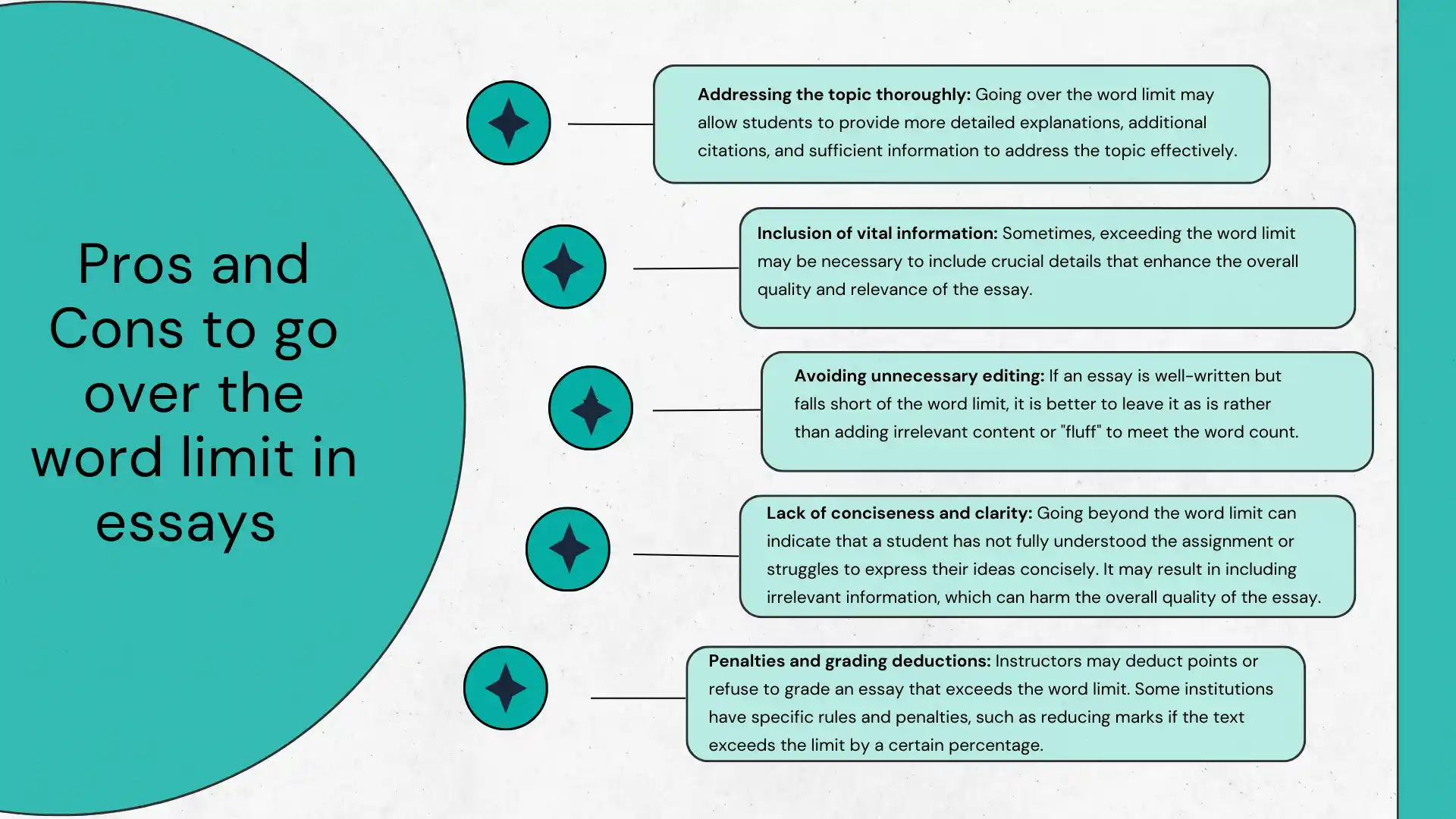The word limit is one of the most crucial parts of the instructions for any essay or assignment. Yet, many students neglect the number of words they need to write and write more or fewer words than needed. Most learners do not feel when they can exceed the word limit and when they cannot. But it’s easier than it first appears.
Today, two of our experts, Leticia Adamson and Sylvia Roberts, will help you with this issue. Leticia Adamson is a Ph.D. in English Literature and head of the ESL program at CustomWritings. Sylvia Roberts has an M.D. in Nursing and is an assistant in the Healthcare and Life Science Department at CustomWritings.
Q: Welcome to our debate today on whether exceeding the word limit in essays and assignments is terrible.
Leticia: Hello!
Sylvia: Hi, everyone! Thank you for inviting us!
Q: Thank you as well! Let’s start with the first question. Why is going over the word limit considered a disadvantage, and what happens if you go over the word limit on university essay?
Leticia: Let us first define the concept of “What is a word limit.” In fact, it is a mandatory requirement for fulfillment, it is not a random number that can be ignored. Each student should read a lot of books to enrich their personal vocabulary. It helps them to express their thoughts while also staying within the word limit for the assignment. Going over the word limit can be a drawback because it indicates that the student has not fully understood the assignment or cannot express their ideas concisely. It can also result in the student including irrelevant information, which can detract from the essay’s overall quality.
Sylvia: Sure, all students need to read a lot, but developing great ideas can be possible without it. Students with limited vocabularies can also express their thoughts. While exceeding the word limit can be a weakness in some instances, it is not always the case, especially when it comes to distinguising essay types and their peculiarities. Sometimes, the students may have vital information that they need to include to address the topic entirely. It is important to remember that the focus should be on the quality of the writing rather than the word count. However, exceeding the maximum word limit is always wrong when writing college essays.
Leticia: One of the most frequent questions students ask themselves and their teachers is “Can you go over the word limit for a university essay?” However, one of the primary reasons why college professors set a word limit is to ensure that students can express their ideas effectively. This is the primary skill involved in essay writing, and it requires a strong understanding of the topic and the ability to organize one’s thoughts in a clear and concise manner. Students who struggle to stay within the word limit may lack these capacities, which can harm their academic success.
In addition to the academic disadvantages of going over the word limit, there are also penalties that students may face. These penalties can vary depending on the instructor and the assignment.
Some instructors may deduct points from the essay, while others may refuse to grade the essay at all. Students must adhere to the word limit to avoid these penalties. The essay word limit is set for a reason. Students must learn to respect the teacher’s instructions and try to follow them to the best of their ability.
For example, professors always specify the length of a given coursework for BASC-coded modules regarding the word count or the number of pages. They also place limits on the maximum size of submitted coursework, and if the text exceeds that limit by more than 10%, the instructor reduces the mark by five percentage points. This is how not following the word limit can cost a student a good grade and affect their overall performance. I urge you to take the question “How many words over the limit is acceptable?” seriously and not ask it your professor every time you write a paper. Exceeding word limit is the exception rather than the rule.
Sylvia: Yet, there are situations where going over the word limit may be acceptable. For example, in scientific writing, the instructions might require you to include detailed descriptions. They may also need you to add data to address the topic. Research has shown that the quality of academic-level writing is more important than the word count, as it determines the essay’s effectiveness (though only for graduate students). Students can also communicate with their professor regarding the word count. If they feel that they need to write more to fulfill the instructions, they can discuss it.
Leticia: In my work, I have graded many essays where students have gone over the word limit because they included irrelevant information. In general, this detracts from the essay’s overall quality and can result in a lower grade. Research by DeScioli & Pinker (2022) has also shown that concise writing is more effective than lengthy writing in conveying ideas to the reader. Famous essayists and writers have also commented on the importance of brevity in an essay.
For instance, William Strunk Jr. is famous for his succinct style, saying, “There is no truth which cannot be given in fifty words; the truth is always concise.” This quote emphasizes the importance of concise writing, and editing and refining helps with that. Editing may also help in such cases by enabling writers to convey their ideas effectively within a limited word count or set of spatial constraints. Thus, if you ask yourself, “How much over the word limit can I go?” I’d say the less, the better. When you exceed word limit of your essay, it brings no good.
Stick to the word count but sometimes students need help with balancing brevity and depth in their essays. That’s where a custom writing service comes in. These services will provide professional help to ensure your essay meets all requirements including word count and is clear and thorough. By getting expert help students can focus on their ideas and arguments and leave the structural and stylistic stuff to the pros.
More Expert Articles on Essay Writing:
|
Sylvia: Yes and no. I have graded many essays where students have exceeded the word limit but still managed to convey their ideas.
Sometimes, going over the word limit is acceptable if it’s done to address the topic and provide the necessary details.
Also, while I understand the importance of concise writing, in academic papers, using long and complex sentences and going over the word limit is possible. Research by Wu, Mauranen, & Lei (2020) has shown that academic writing often requires more complex syntactic structures because they allow us to address a topic more profoundly, especially in fields such as history and literature.
For those who are short on time or overwhelmed with assignments buy essay from a trusted platform can be a good solution. These services offer high quality, original essays written according to your instructions. Whether you’re working on a complex research paper or a simple assignment buying an essay can save you time and give you a solid base for your academic success so you can focus on learning and other things.
For example, Virginia Woolf, a famous writer, always made her essays too long. While attending King’s College London, she wrote essays like “A Room of One’s Own” and “Three Guineas” that are, like, book-length, but they are still accurate. Thus, my answer to the question “Is it okay to go over the word count for an essay?” is “Yes, it is, under certain circumstances and for justified reasons.”
Q: So, with regard to staying within the word limit, both experts agree that editing can be an essential practice. Sylvia and Leticia, do you have any helpful tips and tools for how students can stay within the word limit?
Leticia: Before advising, I should add some crucial information for our college-level students. In college admissions essays, it is important to prioritize quality over quantity. Admission officers have shown that they prioritize the clear communication of ideas over strict adherence to word limits. While admission officers won’t be counting words, they will notice if an essay is too short or too long for the assigned space.
If an essay is well-written but falls short of the word limit, it is better to leave it as is rather than add fluff to meet the limit.
Sylvia: Great point, Leticia. Here I agree with your ideas!
Leticia: Thank you. Moreover, if an essay exceeds the word limit, it is advisable to look at the overall content rather than deleting words line by line. It is important never to exceed the maximum word count. Some colleges may not have a specific word count. But it is still vital to adhere to the best practices, such as writing paragraphs of the appropriate length and using the standard font type and size.
Sylvia: I can offer one more tip. Students must write a rough draft, and then edit it until it fits the appropriate word count. Students can also use online tools to check the word count and reduce the number of words if necessary. They can use Grammarly, for example, for revising the text and removing instances of “wordiness” (These are wordy phrases that do not play an essential role in the essay. Another tool is WordCounter, which helps you count the number of words of your assignment or essay. However, I also emphasize the importance of being concise from the beginning.
Students should avoid using unnecessary words and phrases and focus on presenting their ideas in a clear and concise manner.
Leticia: Yes, adhering to the word limit is vital. But there are times when a student may feel that the limit is preventing them from elaborating on a specific point. In such cases, it may be necessary for the student to communicate with their instructor. They need to explain why they believe that exceeding the word limit is necessary. Some instructors may be unwilling to make an exception. Others may be willing to provide additional guidance to help the student stay within the word limit.
Also, exceeding the word limit can create the impression that the student is incapable of following instructions. It can affect their credibility. However, there are instances where exceeding the word count can be acceptable. For example, in scholarship essays.
Students may need to exceed the word count to provide sufficient details about themselves or their goals.
Similarly, in research papers, adding additional citations and explanations can add value to the paper even if it exceeds the word count. A great way to stay within the word count is to pay attention to limiting words. What are limiting words? These are parts of the question that can narrow or change the focus of your answer. If your essay prompt asks you to write about the first president of America, then your paper should not contain information about any other.
Q: Don’t you think going over the word count can still be wrong in such situations?
Leticia: Yes, of course. Yet, there might be situations where the students feel they need to exceed the word count to elaborate on a specific point. So, it is important to remember that concise writing effectively conveys ideas to the reader. In addition, there are other ways to address a specific point without exceeding the word count, such as using concise language or providing evidence to support the point.
Sylvia: How do you reconcile the need for concise writing with the need to address the topic?
Leticia: I think it’s important to focus on the quality of the writing rather than the word count. Sometimes, a student may need to exceed the word count to address the topic and provide the necessary details. However, it’s important to avoid including irrelevant information and to be concise whenever possible. For instance, when you write an essay about New York restaurants, there is no need to include information about cafes, even though they are also present in that city. This way, they will only exceed the word limit and will not add anything useful to the topic.
By focusing on the quality of the writing, the students can ensure that they thoroughly address the topic while still adhering to the word count.
Q: Thank you both for sharing your perspectives on this topic. It’s clear that there are valid arguments on both sides of the debate. While there are advantages to being concise and adhering to the word limit, there are also situations where going over the word limit may be necessary to explore the topic.

So, let’s sum up, guys! Yes, there are advantages and disadvantages to going over the word limit in essays and assignments. It comes down to the specific assignment and the instructor’s requirements for students. Learners must understand the importance of being concise. They also need to address the topic thoroughly and present their ideas. Students can improve their writing skills and succeed. They can achieve this by practicing editing and being mindful of their word count. It is also crucial for students to communicate with their instructors in cases when they feel that the word limit is preventing them from properly addressing the topic while still adhering to the word limit. As Ms. Adamson rightly pointed out, the maximum word limit is a mandatory requirement, not just a random number that can be ignored.
Recommended reads
- How long is an essay
- Words to minutes speech
- How to make essay longer
- Short essay on baseball






